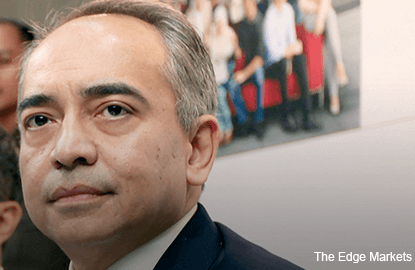
KUALA LUMPUR (Jan 31): Asean members cannot rest on their laurels and need to find avenues to address the many remaining barriers to create a truly competitive regional market, according to CIMB Group Holdings Bhd chairman Datuk Seri Nazir Razak.
"In many ways, the Asean model has lessons to share about how to achieve regional integration," he said at the World Economic Forum Annual Meeting on Jan 17–20, 2017 in Davos-Klosters, Switzerland, which saw the gathering of 10 Asean countries to participate in considering the challenges that lay ahead for Asean.
"We can't rest on past achievements. For Asean to continue its journey, the region must consider how it can address the many remaining barriers that stand in the way of creating a truly competitive regional market," he added.
Among the issues considered included those of cross-border integration as well as improving the education of youths in the region to encourage development of entrepreneurs and small and medium sized enterprises (SMEs), and how Asean countries can address these challenges, moving forward.
"Over the course of 50 years, the Asean organisation has achieved more than anyone would have imagined. Most importantly, it has helped to promote regional peace and harmony so that our nations could develop in an environment of stability and good relations. It has also made significant progress in joining together 10 highly diverse countries into a much more integrated community, with deepening economic linkages that are helping to underpin regional prosperity," said Nazir.
"We have to think about how we can harness digital technologies to create new business models and new development paths. We have to work on building much-needed infrastructure. We have to think deeply about how to educate the youth of the region so that they have the skills for the jobs of tomorrow. And we have to encourage a flourishing of entrepreneurship and the development of SMEs," he added.
Nazir is also Chair of the Forum's Asean Regional Strategy Group (RSG), which is a 30-strong body of regional government, business and academic leaders.
Southeast Asia recorded strong participation in the World Economic Forum Annual Meeting in 2017, which marks the 50th anniversary of the founding of Asean.
According to a statement released by World Economic Forum today, among the more than 100 participants from Southeast Asia were the prime ministers of Vietnam and Cambodia, 22 government ministers from Asean countries, and the leaders of 36 regional companies.
"The record participation of Southeast Asia in Davos this year was a hallmark both of the region's historic 50th anniversary and the region's rising importance," said Head of Asia Pacific at the World Economic Forum, Justin Wood.
"Asean has tremendous economic strength, with 630 million people, most of them still very young and powerful engines of growth in the form of ongoing industrialisation, urbanisation, accelerating technology adoption and improving education.
"At the start of 2016, the 10 economies of Asean were collectively the seventh-largest economy in the world. By the start of 2017, that rank had improved to sixth, and by 2020 it will be fifth," he added.
In addition, the RSG produced a list of proposals that are to be developed over the coming months showcased at the World Economic Forum on Asean, which will be held in Phnom Penh, Cambodia, from May 10 to 12, 2017.